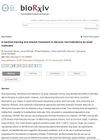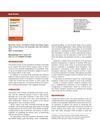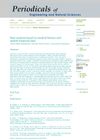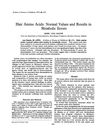Search
for
Sort by
Research
30-60 / 156 resultsresearch Sebaceous-Hairy Apparatus Damage in Androgenetic Alopecia: A Clinical Study of the Efficiency of Some Physical Treatments

research Bifidobacterium Is Enriched in Gut Microbiome of Kashmiri Women with Polycystic Ovary Syndrome
Kashmiri women with PCOS have more Bifidobacterium in their gut.

research A Machine Learning and Network Framework to Discover New Indications for Small Molecules
The model successfully predicted new uses for existing drugs, like using certain hormonal and heart medications for respiratory and Parkinson's diseases, and a cancer drug for diabetes.

research Importance of Vascular Patterns in the Dermoscopy Recognition of Cutaneous Tumors
Vascular patterns in dermoscopy help tell apart malignant and benign skin tumors.

research Androgenetic Alopecia Pattern Hair Regrowth in Patients with Alopecia Areata Treated with Oral JAK Inhibitors
Oral JAK inhibitors help regrow hair in alopecia patients.

research Remodelling of Cytoskeleton and Plasma Membrane Proteins Contributes to Drought Sensitivity of Arabidopsis Rhd2 Mutant
The Arabidopsis rhd2 mutant is more sensitive to drought because of changes in cell membrane proteins and cell structure.

research GTL1 Is Required for a Robust Root Hair Growth Response to Avoid Nutrient Overloading
GTL1 is needed to control root hair growth and prevent problems when there are too many nutrients.

research AIMP1-Derived Peptide Secreted from Hair Follicle Stem Cells Activates Dermal Papilla Cells to Promote Hair Growth
A peptide from hair follicle stem cells promotes hair growth by activating specific skin cells.

research ROS-Degradable Polythioketal Urethane Foam Dressings to Promote Porcine Skin Wound Repair
A special foam called EG7 PTK-UR helps heal skin wounds better than other similar materials, working as well as a top-rated product and better than a polyester foam.

research Wound-Initiated Hair Regeneration by Adhesive and Shrinkable Materials
A new method using special materials can help regrow hair by creating small wounds.

research Book Review: Facial Plastic Surgery Clinics of North America: Hair Restoration
Book covers all aspects of hair restoration surgery, highly recommended.

research Meta-Analysis of Efficacy of Platelet-Rich Plasma Combined with Minoxidil for Androgenetic Alopecia
Combining PRP with minoxidil significantly improves hair growth in AGA patients.

research Hair Analysis Based on Medical History and Spatial-Temporal Data
Hair analysis can provide insights into a person's medical history and location over time.
research Isolation of Sensory Hair Cell Specific Exosomes in Human Perilymph
research No Relationship Between Perceived Health Anomalies and Perceived Experimental Success in Retired Breeder Male Hartley Albino Guinea Pigs
Health issues in retired breeder guinea pigs don't affect experiment success.
research Therapeutic Effects of Growth Factor Cocktail (CellcurinTM) Containing FGF5s (Fibroblast Growth Factor 5 Short) and NMN (Nicotinamide Mononucleotide) in Patients with Androgenetic Alopecia: A Split Study
The growth factor cocktail significantly increased hair growth in patients with androgenetic alopecia.

research A Look Back at Hair Restoration Through History
Hair restoration techniques have improved over time, focusing on better results and less scarring, but skilled doctors are essential for natural-looking outcomes.

research Expanding Clinical Indications of Mechanically Isolated Stromal Vascular Fraction: A Systematic Review
The regenerative solution, tSVF, is a safe and effective treatment for various conditions like aged skin, scars, wounds, and more, but more research is needed to find the best way to use it.

research Prevalence of Dermatologic Manifestations and Metabolic Biomarkers in Women with Polycystic Ovary Syndrome in North China
Women with PCOS in North China often have hirsutism and acne, with hirsutism linked to metabolic issues.

research Coat Condition, Housing Condition, And Measurement Of Fecal Cortisol Metabolites: A Non-Invasive Study About Alopecia In Captive Rhesus Macaques (Macaca Mulatta)
Alopecia in captive rhesus macaques is affected by season, sex, age, housing, and stress, with complex links between stress hormones and hair loss.

research Study of Seed Hair Growth in Populus Tomentosa, an Important Character of Female Floral Bud Development
Poplar seed hairs grow from the placenta at the ovary base, with endoreduplication playing a key role in their development, and share similar cellulose synthesis processes with cotton fibers.

research Clinical Guidance on the Monitoring and Management of Trastuzumab Deruxtecan (T-DXd)-Related Adverse Events: Insights from an Asia-Pacific Multidisciplinary Panel
Proactive monitoring and management are essential to maximize the benefits of Trastuzumab Deruxtecan while minimizing serious side effects.

research Innovative Approach for Polycystic Ovary Syndrome Treatment: Brown Adipose Tissue
Brown Adipose Tissue (BAT) could potentially treat Polycystic Ovary Syndrome (PCOS) by controlling energy balance and lipid homeostasis, but more human research is needed.

research Injection and Application of Micrografts
Micrografts are useful for healing wounds, regenerating bone and periodontal tissues, and improving hair transplantation outcomes.

research Photographic Documentation of Hair Growth in Androgenetic Alopecia
High-quality photos help track hair growth progress in androgenetic alopecia patients.

research Close Correlation Between Hyperandrogenism and Insulin Resistance in Women With Polycystic Ovary Syndrome Based on Liquid Chromatography With Tandem Mass Spectrometry Measurements
Women with PCOS who have high male hormone levels often also have insulin resistance.

research Androgens in Women: Critical Evaluation of Methods for Their Determination in Diagnosing Endocrine Disorders
The conclusion is that standardizing testosterone measurement methods is essential for better diagnosis accuracy in women.

research Hair Amino Acids: Normal Values and Results in Metabolic Errors
Hair amino acid levels can indicate metabolic disorders.

research Artificial Hair Implantation for Hair Restoration
Artificial hair implants can quickly improve looks and life quality, but they have risks like infection and early fiber loss, so more research is needed to confirm their safety and effectiveness.